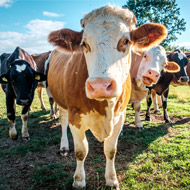Scientists using ‘deep learning’ to predict bTB status in cows

The project aims to produce data that can be used for diagnostic and management purposes.
Researchers at Scotland’s Rural College (SRUC) are using ‘deep learning’ to predict the Bovine Tuberculosis (bTB) status of dairy cows.
Deep learning is a form of machine learning that uses artificial neural networks to learn from large data sets. Researchers hope that by using the method to analyse milk samples, they will strike a significant blow to the disease - thought to cost the UK dairy industry some £175 million every year.
Project leader Professor Mike Coffey said: “This is potentially a great step forward in the fight against TB. Being able to use routinely collected milk samples to alert a cow that may have been exposed to infection will allow the farmer to take remedial action long before the normal testing regime comes in.
“The early removal of infected cows should lower the background level of TB and contribute to enabling more effective outcomes from the existing tools deployed to eradicate the disease.”
The project has received £337,000 from the Biotechnology and Biological Sciences Research Council (BBSRC) to produce data that can be used for management and diagnostic purposes. It also aims to produce data for potential inclusion in national genetic evaluations for bTB host resistance.
The funding follows Defra’s review of its 25-year bTB eradication strategy, which now specifically includes “improved genetic resistance and improved diagnostic tests”.



 The Federation of Independent Veterinary Practices (FIVP) has announced a third season of its podcast, Practice Matters.
The Federation of Independent Veterinary Practices (FIVP) has announced a third season of its podcast, Practice Matters.